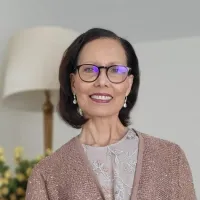Solid Ground Topics
"Building Leadership, Purpose, and Healing on Unshakable Truth"

Implicit Biases
A man who wants to lead the orchestra must turn his back on the crowd. ~ Max Lucado
Fallacy: To Know Better is to Do Better
Pragya Agarwal, in her book, Sway Unraveling Unconscious Bias, explains through research from various disciplines, real stories, and scientific theories the unintentional biases we all experience. Dr. Agarwal demonstrates where the biases come from, how they affect our perspectives and decision-making, and most importantly, why it is necessary to unlearn them. In her book, she distinguishes between explicit bias (which is purposeful) and implicit bias (which is at the unconscious level). Implicit bias is the more challenging to recognize as it has been developed over a person's lifetime and has attributes that stem from the human evolutionary process. Dr. Agarwal's book is a worthwhile read and certainly belongs in my library - but at the end of the day - what do I do with this not-so-new information? Three things came to mind that I'll summarize in the remainder of my blog.
Emergency Room Treatment
The first is a point from Dushaw Hockett, a speaker from TEDX MidAtlanticSalon. His topic was "We All Have Implicit Biases." He encouraged the listeners to move from "emergency room treatment of implicit bias to preventative care."[1] His research shows that we are attempting to treat racial biases based on explicit biases in this country. While dealing with explicit biases is necessary, the lack of treatment of our implicit biases keeps this country from moving forward. We wait for the next eruption or emergency before we take action. And the action taken is to talk about or treat the explicit bias. This action is synonymous with treating the symptom rather than the root cause. We overlook the culprit causing most of the problems - in this case, it is our implicit bias. Those beliefs, based on implicit biases, "run contrary to our stated conscious beliefs."[2]
System 1 Thinking
The second point I've pondered is that Dr. Agarwal, other behavioral scientists, and mental health professionals' research indicates that implicit bias can be unlearned. Still, it takes a lot of self-work. According to Dr. Agarwal, the unconscious bias is based on System 1 thinking.[3] This is the same System 1 thinking we learned about from Kahneman. It is unconscious and happens naturally. So how do we uproot our implicit biases? It is my opinion that first, each person must find a ‘why’. For example, many overweight people or people in a financial crisis have probably read every diet book or budgeting best seller. It's not that they often don't know what to do. They have yet to find a reason to do it that's important to them - a why. Additionally, uprooting implicit biases is not only hard work; in some cases, it goes against family traditions and may cause alienation from social groups. So there's a lot at stake to uncover implicit biases and unlearn them. Therefore, a ‘why’ will provide a benefit greater than the perceived risk associated with unlearning implicit biases.
Our Identity in Christ
This brings me to my last point. Assuming that finding a 'why' is integral to uncovering and unlearning implicit biases, then it would be difficult for people who do not know Christ to succeed. In this case, finding the 'why' cannot come from within because of humankind's sinful nature- tribalist, fearful, and sometimes hateful. The 'why,' in this case, has to result from a belief in something higher than what we could ever imagine. God wanted a family of multi-ethnically diverse and multi-colored people who are co-heirs and equal in Christ and who love him by loving each other. As Pastor Derwin Gray writes in his book, How To Heal Our Racial Divide, "Our ethnic differences are not obliterated; in Christ, they are celebrated…Our socioeconomic differences, in Christ, become a pathway to mutual learning and cooperation…Our male/female differences are not blurred or erased; in Christ, they are embraced and complement one another to bring glory to God."[4]
Closing
In closing, in Christ, we have the key to unlocking and overcoming explicit and implicit biases. However, rather than provide the world with an alternate reality of how to live and love, the Church is once again missing in action. Sadly, we have regulated our Savior lower than our System 1 thinking.
[1] Dushaw Hockett, We All Have Implicit Biases, TedXMidAtlanticSalon, https://www.youtube.com/watch?v=kKHSJHkPeLY
[2] Ibid.
[3] Pragya Agarwal, Sway Unraveling Unconscious Bias (Dublin: Bloomsbury Sigma, 2021), 29.
[4] Derwin L. Gray, How To Heal Our Racial Divide: What the Bible Says, And The First Christians Knew, About Racial Reconciliation, (Carol Stream: Tyndale, 2022), 43.

